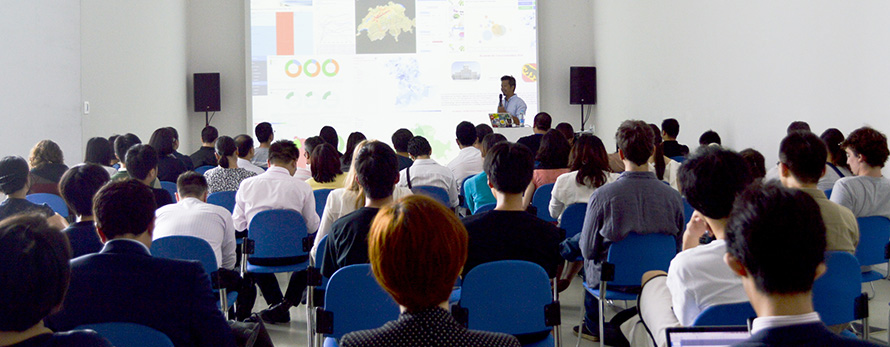 During Lift China, Feng Gao and TH Schee, two entrepreneurs from Shanghai and Taiwan, held a workshop on open data and its implications in Asia.
During Lift China, Feng Gao and TH Schee, two entrepreneurs from Shanghai and Taiwan, held a workshop on open data and its implications in Asia.
We thought the timing was right to send in our writer extraordinaire, Eugénie Fontugne, Swiss-French postgraduate student in Media and Communications at the London School of Economics and Fudan University. Here is her summary of the workshop and a great way to update your knowledge in open data.
Lift organised in 2013 the Open Knowledge Conference in collaboration with their Swiss chapter, Opendata.ch. Have a look at their website for the latest news on the subject.
Data…Big data…Open data… Data has become not only one of the hottest topics in the tech industry but also a valuable currency. How can one not be lost in this era where data are so ubiquitous?
Well, well, well lucky you! Look no further! TH Schee and Gao Feng were at Lift Shanghai to help us untangle all this data maze.
Sorry but what is this “Big Data” thing?
Interactions on social media, uses of mobile apps or even the most insignificant electronic payment produce highly valuable data that once analysed provide with a staggering amount of information about users, their preferences and their habits.
Well, basically, every single citizen produces millions of data on a daily basis – both online and offline. Billions of data are created on a daily basis and they help to define, localise and identify every single e-citizen.
The creation of this data, as well as its analysis, is what we commonly call in the tech jargon “Big Data”. Big Data can be summarized by the 3Vs:
- Big Volume
- Large Variety
- Ultra Velocity
Lift Conference – the presenters


Feng Gao has recently completed his PhD in the UK. He co-founded Open Data China and is a local ambassador of the Open Knowledge Foundation.
TH Schee is a self-declared “serial social entrepreneur” from Taiwan. Among other successful ventures, he has co-founded Code for Tomorrow to help the Taiwanese society to fully embrace the Internet and the endless opportunities it can offer.
They are both promoting open data or in other words, how to make the mind-boggling amount of data shared and consumed on the Internet and new media – namely social networks, mobile apps, the cloud - available to the majority of citizens. They are participating in many events in order to raise awareness about open data potential. Indeed, while data are shared freely – and sometimes mindlessly – by users, it is often not shared and available to everyone. Indeed, early on, big corporations and governments have detected how valuable these data pools could be and therefore, have created some barriers in order to exert some control over this data.
Big Data vs. Open Data?
Before the workshop, I had the chance to meet the two presenters and to ask a few questions about open data. Indeed, I have heard about Big data – who has not? But open data was still quite obscure.
Open data is all about:
- Open Access – no firewall, no barriers. This is often where the problems arise.
- Open Content – every single type of content can be and should be freely exchanged.
- Open Source – no copyrights, patents or any mechanisms of control whatsoever.
To summarize, open data is big data made public and available to general audiences: an environment in which data are traded without any limits or barriers.
As TH Schee mentioned “Right now, people see data as a property. They own it without properly exploiting it and most of the time, they keep data for themselves while data should be considered as a currency, that could be traded in a continuous flow.”

Lift Workshop
The workshop started with TH Schee explaining that open data’s future mainly depend on finding an efficient vehicle to provide social entrepreneurs with a platform “to jump in” in order to raise awareness about open data.
Indeed, for the serial entrepreneur, the ability to translate data into “real world story” is key. The International Open Data Day is a good example of what TH Schee is trying to do to nurture open data efficacy. Indeed, as he poetically explained – the web is about connecting the dots and about connecting the world. Open data’s aim is the same – to allow for a free trade and continuous flow of information.
Well, easier said than done. Indeed, “Open Big Data” is such a new phenomenon that it is still challenging to grasp its potential and to establish the best way to use it.
Only imagining the volume that this data represents beggars belief. Equally, it is completely disrupting how our societies work. As a result, technological companies and governments are not necessarily keen to share the gold mine with the public.
Now, enough with technical and complicated terms!
After this rather theoretical introduction, TH Schee moved on to provide the audience with a wide array of open data examples and how data is designed and “translated” for the public.
- OpenStreetMap is based upon real time information about transportation and traffic, which are willingly shared and updated by volunteers. Some sort of crowdfunding.
- City Dashboard provides users with real time information about the weather, air pollution, bike sharing, twitter tweets, subway in a nicely and colourful designed control panel.
- Tender Noise and Datavisualization aim at translating “noise data pollution” into useful and straightforward information.

These apps successfully translate “raw data” into images, captions or charts in order for the general public to understand them. Raw information becomes “eatable data”. Ethical and privacy concerns can arise depending on the “translation” and the media vehicle.
Open data is slowly being taken seriously and TH Schee now advocates Open Government in which all the citizens such as fire-fighters, elders, people working in foundations help to create a valuable database in order to create more harmonious and equal societies.
The second speech by Feng Gao was more based upon open data in China. According to the Open Data Index, which sorts data about transportation, government budget, elections, companies, national statistics and even emissions of pollutants, China ranks 41, head to head with Taiwan, Indonesia and Hungary but far behind the UK (1st), the USA (3rd) or Northern countries such as Denmark, Sweden or Finland. This relatively poor score can be attributed to the absence of data on government spending and election results (as there are no elections per se in the country).
Yet, according to Feng Gao, data in China are increasingly made available to a larger part of the population. Official national data are being released but the biggest change is more visible at the regional and local levels. Indeed, following suits of Shanghai and Beijing, Wuxi, Nanhai and Qingdao – to only name a few – are slowly but surely releasing official data about the city and their citizens.
At a more international level, things are also moving. Websites, such as East/West Chats offering online instant messenger - facilitate discussions on open data between – as its name indicates – West and East.
Masterclass / workshop
The aim of the masterclass was to create an app or social platform targeting Shanghai citizens – be they locals, migrants, expatriates or tourists - using sets of public database (from public places, sports areas to vegetable prices and the number of mobile phone subscribers). Again, translating raw data into useable ones.
The audience was divided into two teams made of around 10 attendants. After a two-hour brainstorming, teams had to pitch their ideas. They both came up with two interesting yet relatively similar ideas: a dashboard providing information depending on the user’s needs and expectations.

In the end, after so many information released by our two presenters, it is my role to translate them into something eatable: already applying the open data concepts – translating and processing raw information out of a conference on open Data.
So, if you had to remember only one thing: open data is unreadable data made readable - through beautiful designs and user-friendly interfaces. By enabling people to read this data, applications and websites are empowering citizens. Indeed, information is knowledge and knowledge is power but so far, these data remain the property of big multinational corporations and governments. Barriers are hampering data from being currency exchanged and consumed in a constant flow.
In the end, the future of open data, and to a certain extent open government, depends upon markets’ stakeholders willingness to open up and propensity to share. It all goes to the same question, who wants to share power when it is already theirs?
Oh and also, one last cheerful note: Switzerland, with successful apps, has been praised by both presenters as ahead of the game in data translation. Hop Schwizz! Way to go Switzerland!!

 During Lift China,
During Lift China, 



